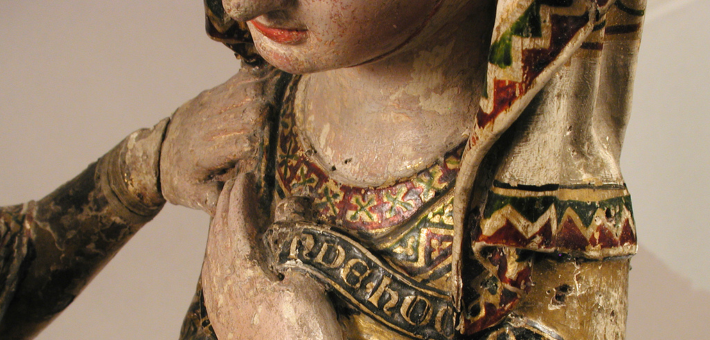Commentary on Luke 1:46b-55
The Magnificat is Mary’s song of praise to God, which she proclaims as her relative Elizabeth welcomes her into her home. Mary is a betrothed young woman, likely no more than an older adolescent. She has become pregnant prior to the consummation of her marriage. While this is not an unheard-of situation for a young woman to find herself in, Luke makes it clear that her fiancé, Joseph, is not the biological father of Mary’s child.
This places Mary in a precarious situation. In the early first century, when Mary sang her song, during betrothal the man had legal rights over his fiancée, and though they might not be living together yet, she could be called his wife. The engagement could end only through divorce. If she had sexual relations with another man during this time, it would have been considered adultery.
Preachers sometimes cite Deuteronomy 22:23–27, which discusses the circumstances in which a virgin who is violated may be stoned to death, as evidence of Mary’s endangered state. However, it is unknown whether this law was enforced in the first century CE. While Luke likely knew this text, there were other cultural realities that placed Mary in a vulnerable position. Luke was probably aware that women who bore children outside the bounds of marriage were sometimes pressured to abandon their infants. Such a child was a source of shame for the family, and communities were often unwilling to help raise a child of uncertain parentage.
Mary retreats to her relative Elizabeth’s home, perhaps seeking support from the older woman, who is also pregnant. But instead of despairing about her circumstances, Mary proclaims the greatness of God. She declares that God is her savior, the one who has delivered her from an oppressive situation, just as God delivered generations of her people before her. As Mary declares the close relationship she has with God, she proclaims that she is the doulē of God, God’s servant.
This term, doulē, is a troubling word, because it can also be translated as “slave,” drawing to mind the inhumane treatment of slaves in both the Roman and the US context. However, Luke only uses doulē in reference to Mary and uses other terms, like paidiskē, to refer to enslaved females in the Gospel. Thus, it is clear that Luke has a specific meaning in mind here.
In these verses, Luke draws upon Hannah, the mother of Samuel, who also becomes pregnant and pours out her heart to God. In the Septuagint version of 1 Samuel, Hannah refers to herself as doulē, first in relationship to the priest Eli (1 Samuel 1:16, 18) and then in reference to her relationship to God (1 Samuel 1:11). While the image of subordination is still troubling, in the Magnificat it is how Mary describes herself as a proclaimer of God’s word.
Indeed, many scholars argue that Mary is taking on the posture of a prophet, that her words are prophetic, like her forebear Miriam, prophet and sister of Aaron (Exodus 15:20–21). Mary’s song proclaims the goodness of God, who reverses the fortunes of the powerful, bringing them down to the state of the common people, and who raises up the fortunes of those low on the social scale so they will hold a place of status in society. She declares that God reverses the fortunes of those who are hungry, so that food insecurity will no longer reign among the masses; and that those who are rich will not receive handouts they do not need. She then declares God’s deliverance of God’s “servant, Israel.”
Here the Greek word, which the New Revised Standard Version translates as “servant,” is not doulos but, rather, pais, which could mean either “slave” or “child.” In this case, I prefer to translate pais as “child,” such that Mary declares that God has come to the aid of God’s child, Israel, rather than to God’s servant or slave, Israel. “God’s child, Israel” creates the image of a parent helping their child—the same gracious parent Mary has just sung about, who provides food for God’s children in need.
Biblical scholar Amy Krall has written a paper about the Magnificat, discussing four choral versions of Mary’s prophetic words: Palestrina’s Magnificat primi toni, Bach’s Magnificat in D major (BWV 243), Tompkin’s Magnificat (Fifth Service), and Walker’s Magnificat.1 Krall discusses how these words in Luke’s Gospel, though originally cast as the words of the young woman Mary of Nazareth, have become the community words of the church. Each choral setting of the Magnificat has become a “musical exegesis,” in which the whole church takes up Mary’s song and becomes Mary’s voice.
These four versions of the Magnificat alternate between a solo voice and a choral response. While they vary in which portions of the Magnificat are solo or choral, in each version Mary’s proclamation “All generations shall call me blessed” is sung by the choir. The voice of the whole community embodies Mary’s song of praise. A diversity of voices has taken up her declaration of God as the one who reverses the fortunes of the people, bringing those with little to the front of the line, while those who have much become the supporting voices in their ascent.
This Advent season—a time of year when the country becomes enthralled with having more; when the blaring sounds of “Christmas” drown out the Gospel’s song of what this humble birth means for God’s people—I urge you to embrace Mary’s words as the song of your community. Take forth her proclamation of all that God has done for you and for the least among you. Reimagine what your community can do for all people, so that as Christ enters the world anew this year, it is not to the blast of Christmas lights declaring the excess of this world, but rather as the gentle hand of God’s child reaching out, waiting once again to see what we will do with this good news for all people.


December 22, 2024